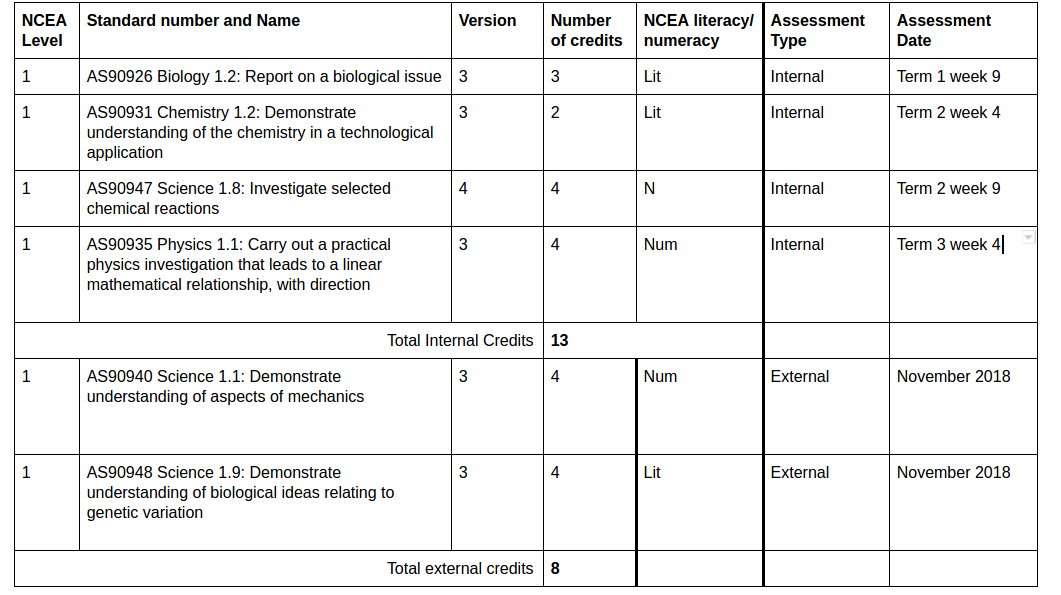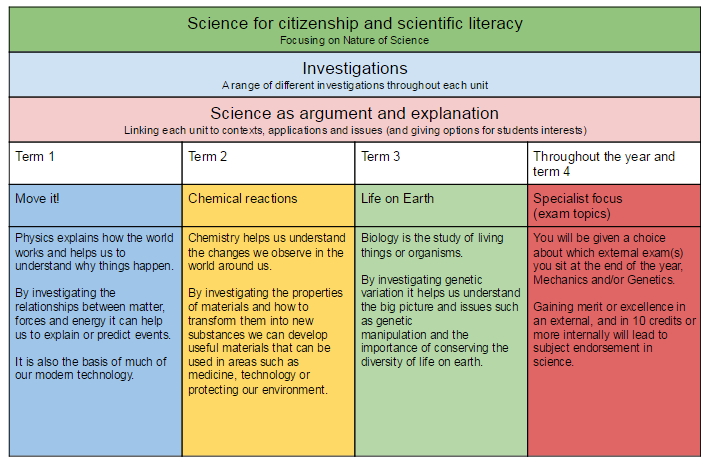Albany Senior High School/Coursebook/1SCI
| [▲] | |
|---|---|
| NCEA Level: | |
| Primary Qualification: | |
| Primary Learning Area: | |
| Date: | 06/02/2018 |
Contents
[hide]What is this course about?
Are you curious about your world? Do you enjoy a being creative? Can you carry out experiments? Do you enjoy a challenge? This course is for you!
Science is everywhere, our modern way of living depend on science and technology.
The aim of this course is to allow you to make informed choices by engaging with science on a personal level.
Why you should study Science!
Increasingly the challenges we face as a community depend on science – be it at the global level such as dealing with climate change or at the local level such as the problems of an ageing population, of environmental degradation, or of enhancing our economic productivity through science and innovation.
Studying science prepares ALL students for their future, by:
- developing a practical knowledge of how things work, with enough understanding to appreciate the technological environment in which you live and work, the environmental complexities of the world you live in, and the way the biological world, including your own body, works.
- develop knowledge of how the scientific process operates and have some level of scientific literacy so that you can take an informed participatory role in the science-related decisions that society must take – ranging from climate change to the use of new assisted reproductive technologies.
- develop knowledge of scientific thinking so that you are able to distinguish reliable information from less reliable information.
What will I learn?
You will develop Scientific thinking
As a scientists you will develop ways of thinking that help you to study the world around you and use the information you collect to make informed decisions. This is called science for citizenship and scientific literacy.
As you develop scientific thinking you will learn about the Nature of Science, which tells us about what science is and how scientists work - you learn to think and behave like scientists.
You will carry out investigations, such as fair testing, identifying and classifying, modelling and pattern seeking.
You will also carry out research, to find out about applications of science, how things work, issues and challenges that involve science.
Your scientific thinking will be developed and applied through the study of 3 main topic areas as shown in the table below: Move it!, Chemical reactions, Life on Earth. You will also have the chance to specialise in these areas through student towards external exam(s) in biology, and/or physics.
What sort of things will I do?
As well as the investigations, research, arguments and explanation outlined above the following activities will be an important part of your science work.
Collect evidence of learning
Your teacher will share information with you via google classroom and be responsible for using google apps (such as google docs) to collect evidence of your learning, which will be used as a basis for your assessments. Your teacher will give you ongoing feedback on your evidence of learning to support you to gain quality credits.
Online tools
We will use a range of online content and application to support student learning such as google apps and VERSO. It is highly recommended that students have their own internet and capable device in to use in class and at home.
What standards are covered by the course?
In this course you will complete four internal assessments and will be given the option to choose from two external assessments. The internal assessments are worth a total of 13 credits and each external is 4 credits.
There are no re-assessment opportunities. The topics covered during the year include material from the external exams, to enable you to choose and study for the external exam(s) you wish to select.

Course Endorsement
A merit or excellence course endorsement for Science may be obtained by completing 14 credits in the above standards at merit or above for merit course endorsement, or 14 credits at excellence for excellence course endorsement. The 14 credits must include at least 3 external credits, and must be completed in the same school year. More information about NCEA course endorsements is available here: http://www.nzqa.govt.nz/providers-partners/assessment-and-moderation/managing-national-assessment-in-schools/course-endorsement/
Vocational Pathways
Vocational Pathways provide a framework for students to show how their learning and achievement is valued in the workplace by aligning learning to the skills needed for industry.
Follow this link to see the profiles for this course.
Assessment Calendar
Link to the ASHS Assessment Calendars
What else?
What is expected of me in Level 1 Science?
- that you are willing to take on challenges and try out new ways of doing things.
- that you are responsible for your own learning by making a good set of notes and keeping records of what you learn.
- that you regularly review the notes from your lessons and revise key ideas.
- that you keep up to date with classwork and homework and act on feedback from your teacher to ensure successful completion of assessments for NCEA.
- that you work towards a high level of achievement in all NCEA assessments.
- that you provide authentic evidence for assessment and reporting purposes.
What about homework and workbooks?
There are write on workbooks for each main topic that will be used in class and for homework. Details of the cost of these will be emailed to you in term 1 and the supply of these books is organised through the school.
We also extensively use google classroom, google apps and VERSO in the Science department, and therefore please ensure students bring an appropriate device to access these applications as recommended by our Bring Your Own Device information https://drive.google.com/file/d/0B-pxrUV-jc4zcktualVGWnZzNWc/view?usp=sharing
What stationery, do I need?
The usual basic stationary and:
- we highly recommend bringing your own internet and capable device in order to use google apps in class and at home, and to use Education Perfect.
- to supplement your record of learning on google apps please purchase a 2B8 hardcover lecture book
- pencils and a ruler for diagrams and graphing
- a scientific calculator Casio FX9750GA Plus or FX9750GAII (or similar)
- scissors and glue will be useful
